

Published on the Website of the South African Military History Society in the interest of research into military history
Copyright Peter Gray. December 2004.
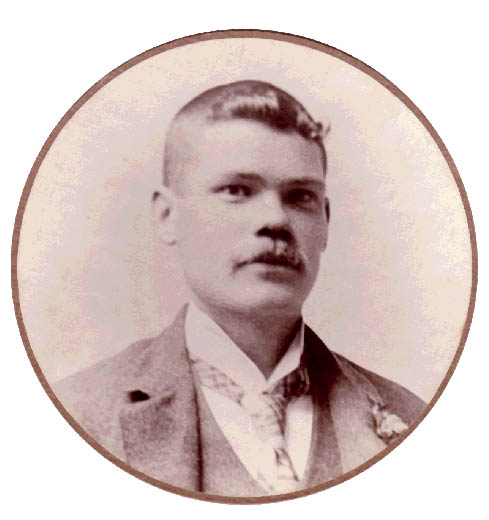
John Johnson was born in 1868 and died on 4th August 1912 at the age of 44 of pneumonia. He was originally from the Potteries where his father, Levi Johnson, was a miner. In April 1892 he married Charlotte whose maiden name was also Johnson. They had three children; Charlotte, Ernest and May.
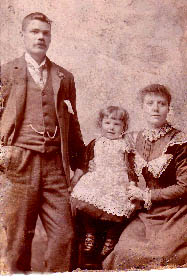
The Anglo Boer war started in 1899 and in February 1900 John sailed with the 1st Durham Light Infantry to Cape Town and then on to Durban. He spent 29 months in South Africa fighting in many campaigns including the battle for Laings Nek and the Transvaal campaign. During the majority of this time he kept a diary and this document is a record of that book.
His enthusiasm for Queen and country is evident during the first few months but a sense of injustice and contempt for the officers and treatment by the Army soon become apparent. This is centred on the water cart that accompanied the column. According to John this water was used by the officers for "whiskey and to wash their feet" while the men had to find their own water in the dark and after marching many miles in very hot weather. The contempt seems to have been mutual since the officers seemed to go out of their way to make life difficult for the troops. Obviously he did not show his feelings since his discharge papers describe his character as "Very good" and he was awarded two good conduct medals.
Very little is known about John Johnson but it is understood that on his return from South Africa he told his family that he had more sympathy for the Boer cause than he had for the British cause.
Although the diary did require some correction, it is remarkable bearing in mind the very brief formal education he would have had as a miner's son. It has been a fascinating and sometimes emotional task since you can feel his frustration about the way that he and his colleagues were treated by the officers, who he describes as "bits of boys". The hardship the soldiers had to endure would now be totally unacceptable.
In addition to the diary, John brought back souvenirs of his time in Africa. Photographs of these and his medals are included.
PAG
17 December 2004
The diary
We set sail on the good ship Assaye(1) on February 28th 1900 for South Africa to join our regiment 1st Durham Light Infantry. We had a splendid voyage we only had two deaths on board and when we got to Cape St Vincent we to know that Ladysmith was relieved and we gave a great British Cheers. We stopped 24 hours at Cape St Vincent for coal and then we sailed for Cape Town. Nothing unusual occurred until we got to Cape Town where we stopped all night for more coal. We got to know that we were not going to sail until late the next day so we all made a rush to get off the boat the next morning but we were not allowed off without a pass. Of course we got passes and off we went to Cape Town about one mile away and very glad we were to get off to stretch our legs a bit. We sailed the same day for Durban but I am sorry to say we left 13 men behind us absent. Durban is 3 days sail from Cape Town so we were not sorry when we got to Durban. We were beginning to get sick of our voyage but I must say it was a very good one we got plenty to eat that was very good and our captain of the boat was a very nice gentleman. He told the officers anyone would think we were coming home instead of going out to fight the Boers. We were that happy and played at all sorts of games. Well we landed at Durban and we were not long before we were in cattle trucks and off to the front. We got to our base of operations a place called Pietermaritzburg the capital of Natal about 75 miles from Durban. We stayed there 4 days and we were bundled off to the front to join our regiment at a place called Elands Laagte where French gave the Boers a cutting up. There was a lot of old faces that I knew.
(1) HMT Assaye was a P&O Line troopship built in 1899.
Tuesday 20 March 1900
We have been resting here with orders to hold our ground which we have won and paid very dearly to for it by orders of Lord Roberts. We paraded this morning for a farewell speech from our general as he was going to leave us to take up a larger command up the other side. It was very touching the little speech he gave to us to us. As he was full up he could not say much so we gave him 3 good old British Cheers and then we wished him the best of luck and were sorry we could not go with him and a very brave man he was too. General Lyttelton was his name, in command of the Light Brigade. He went away with tears in his eyes.
Tuesday 10 April 1900
We have been here now a month thinking and anxious to get at them again. Things are very cheap here you can get a penny bottle of lemonade for 9 pence and Kops ale for 1/- (one shilling) a bottle. I say it is very hard for poor Tommy but he paid like a gentleman. We have had a company of Volunteers to join us here and we have been on parade this morning about half an hour when to our surprise the Boers opened fire on to us with there big guns from there positions in the Biggarsberg and they had the range very nicely and they kept putting shrapnel shells into us and they killed 2 of the Naval Brigade but the gallant boys in blue, or rather I should say khaki, soon got to work and got their guns in action and crippled the Boer guns. We struck our tents under heavy shell fire and retired under the ridge of the hill. T'was a treat to see some of the volunteers running mad, some of them getting behind their tents others getting into holes in there fright poor chaps as this was the first time that they had been under fire. I had a very nasty job of carrying big shell to the naval guns but everything was very quiet thanks to our Colonel who kept so very cool under fire, up to now. We laid under arms all night without even top coats only had our waterproof sheets and they were like paper. The cold was something awful but the next day we went to a place called Buys Farm about 6 miles to our rear.
Tuesday 17 April 1900
Came off outpost this morning and packed up and moved off in the direction of Modder Spruit as the Boers were trying to cut our line of communication. We reached our destination about 1pm and pitched camp there being plenty of newly formed troops here.
Tuesday 1 May 1900
We hear today that we are going to make a start on a big trek, 134 miles to take Laings Nek.
Monday 7 May 1900
Came off outpost and packed up as we were told we were off on a big trek. We moved off about 1 pm and we halted for the night at a place called Collins Farm about 12 miles distance with orders to move on tomorrow.
Tuesday 8 May 1900
We should have gone on today but a native runner came in to say that the Boers were trying to get behind us so we halted for the day. Our cavalry going out and driving them back.
Wednesday 9 May 1900
Up at day break and marched into Sundays River Drift, a distance of about 14 miles. We got in at the afternoon and bivouacked for the night and the next day to allow some of our draft to join us but we went off the same day about 3pm. We crossed over the drift and we halted along side of the road to allow a convoy of 15 miles in length to pass. As our regiment formed the Baggage Guard we lay there for about 6 hours and then we got on the move again at about 8pm. We marched all night until about 2am a very piercing cold night. Off again on Saturday.
Saturday 12 May 1900
Paraded about 8am and marched to a place called Vermacks Krall [Kraal], a distance of about 12 miles from our last camp, Wash Bank is the name of it. We bivouacked for the night.
Sunday 13 May 1900
Off early this morning. We had some dirty coffee and I went to the water cart to get a drink of water. After I had got a half of a canteen full, a young snot of an officer made me empty it out into a pail so I had to go without and then the Boers started shelling us. We had 3 men wounded but we soon got them on the run again. We went steadily on until we came in sight of the most forward position the Boers could hold. It is called Helpmakaar Pass surrounded by large hills there is a big battle going on now by our artillery and the Boers. We manage to get half way up the pass but our cavalry have got through the pass but we halt for the night and bivouac for the night close to Stone Hill Farm, half way up the pass. We are very tired today and it is very cold tonight.
Monday 14 May 1900
Up at 4am to get on the move and we get through the pass onto the top of the Biggars Berg Mountain. It is very level now we are on the road for Dundee but we halt at a place called Pieters Farm after a very long march. The Boers have set all the veldt on fire, it is awful marching and we again bivouac for the night.
Tuesday 15 May 1900
Up at 4am to get on our way to a place called Dundee. It is a pretty little town but as we marched through it we could see that the Boers had not forgotten it. They fairly wrecked all the British homes. We had done 23 miles that day in a broiling sun and choked for water and chasing the Boer every inch of the way so as to keep them on the go as soon as we shifted them from their strong positions in Biggersberg. They would not stop to give battle - a grand Boer hunt. Next day we could not go on as the bullocks were done up so were we. We were not sorry to have a days rest so we washed our socks which helped us on our way a lot the next day.
Thursday 17 May 1900
On the move again this morning and we went 15 miles to a small place called Dannhauser. Halted again and bivouacked for the night with orders for a very long march the next morning.
Friday 18 May 1900
Moved off at 4.30 and continued our march to a place called Newcastle a distance of 25 miles and we arrived there at 6.30 pm after 14.5 hours marching. Thoroughly done up. It is a very nice town but the Boers had not forgotten to destroy all the stores and to burn the buildings. We had a very long way to go for water when we got in and a very dark night. The water cart was for the officers to wash in we could not get any of that water.
Saturday 19 May 1900
There is no rest for the weary, ours being the only regiment to advance into a place called Ingogo a distance of 12 miles and a very bad road, all hills and passes. This is where the 3rd Kings Royal Rifles were cut up in 1881. We landed at about 3pm and we bivouacked for the night.
Sunday 20 May 1900
We settled there today but our cavalry went out to feel for the enemy but they soon got chased back by the Boers who held a very strong place to the North of us. The Mounted Infantry marched into us today from Basutoland in Zululand.
Monday 21 May 1900
Up early this morning with orders to proceed to a place called Mount Prospect, across the Ingogo river a distance of 10 miles. We arrived safe but we had to go through the river. I got up to my stomach in the water. It is not very nice to get wet through and then sleep out all night. We arrived safe. We marched through Dundonald's Cavalry who held the Ingogo River. We proceeded until we came to our destination. We bivouacked under Inkwelo Mountains. Very, very cold. Majuba Hill on our left front and plenty of Boers to be seen at our front.
Thursday 24 May 1900
We paraded for the Queen's Birthday and gave 3 cheers and then it was officially announced that Mafeking was relieved which was very good news to us. The Boers were shelling us from the Pugwana with a 6 inch gun. They could not shoot to keep themselves warm. I went down to get a bath and a piece of their shell or shrapnel flew into the water, I was soon out of it.
Tuesday 29 May 1900
This is the coldest place I have ever been into. Plenty of frost, very little sleep and the worst of it, on short rations. You can't get anything here. All that you can hear is shall we attack Majuba and Laings Nek. If so, it is all up to the Durhams as the Boer trenches are plentifully to look at from here but we have got them out of some nasty places and we mean to get them out of these, if it is only the bayonet.
Saturday 2 June 1900
Still here. General Buller went out this morning with a flag of truce to the Boers and tried to explain to them the condition that they were in. We had sent a strong force around Bothas Pass flanking them and they did not know it. He asked them all to surrender as they were in a hopeless condition but Botha asked him for 3 days armistice to hold a council of war, which Buller gave him.
Tuesday 5 June 1900
Buller went out again this morning to see what Botha was going to do but Botha would not surrender. He told Buller "there is Laings Nek and Majuba" but if he wanted them he must come and take them. General Buller told him that he and his men would be shifted from their positions sooner than they expected, so expect a big fight tomorrow.
Wednesday 6 June 1900
The fun began this morning with our big guns firing on the Boers strong positions, the enemy answering back very quickly with their Long Tom on Pugwana. But their shells were no class. They fired a 100 rounds out of their big gun and only killed 1 horse and wounded 1 man. News came through that General Roberts had entered Johannesburg. We all expected the war to soon be over.
Thursday 7 June 1900
The same old game today plenty of big gun firing but very little damage done. General Buller is going to start and take Bothas Pass with the 1st Division. If he does not succeed it is left to the Light Brigade to make a frontal attack in exactly the same way as they did in 1881 when they got cut up. Our general says there will be at least 3,000 casualties on our side if we have to go this way. Very nice to be going on with. Let us hope Buller gets through Bothas Pass or else it is all up with a lot of us because we are sure to go under.
Friday 8 June 1900
Early this morning we could see Buller with his troops marching for Bothas Pass. All our big guns covering his advance and we could hear plenty of rifle fire at night. Our troops had command of the pass thanks to our big guns. Our casualties were very slight.
Saturday 9 June 1900
The troops with Buller had forced the pass with very little loss. The Boers losing very heavy they set fire to all the grass to drive us back but the wind turned it on all their wounded and burnt them all to death as they lay helpless on the ground. Price of them
Sunday 10 June 1900
No fighting today as it is Sunday. It is getting an acknowledged thing now not to fight on a Sunday.
Monday 11 June 1900
General Buller is getting well around Majuba. We are waiting patiently for good news.
Tuesday 12 June 1900
Buller has rushed the Boers from their strongest position in South Africa which they called the Gibraltar of South Africa, otherwise Laings Nek and Majuba. Then we received orders to pack up and proceed through the Nek, landing through about 7pm. As soon as we got through my company was for outpost half way up Majuba and all the veldt was on fire. A very nice sight, it being very cold indeed but we did not care as long as we had shifted them out of their stronghold. The next day we got our tents for the first time for over 6 weeks. All the men were 2 years younger when we got Laings Nek and Majuba but the Boers had blown each end of the tunnel up. They had not much time to do much more damage so we stayed here for 7 days to repair the tunnel and we got bread and fresh meat. It was a Godsend I can assure you, the first for over 2 months.
Monday 18 June 1900
Up early this morning and a few of us had a walk to the top of Majuba hill. We all got leave to go and I can tell you it gave us a pulling up to get on the top nearly 8000 feet high. I saw the place where Colley fell in 1881 and I plucked some small flowers from there and sent them home There is a lot of soldiers graves of the 58th regiment, they must have suffered the most and the Boers had it all lined with splendid trenches. No army in the world could have got us out of there.
Tuesday 19 June 1900
Up early this morning with orders to pack up and move to a place through Charles Town and Volksrust. The Boers had done plenty of damage to the town of Charles Town it being the most northern town in Natal. Halted about 4 miles beyond Volksrust, being well into the Transvaal at last. After cleaning the Boers out of Natal, which cost us so many brave lives, we never had our line of communication cut by the Boers. We bivouacked at a place called Jouberts Farm, having marched 14 miles today.
Wednesday 20 June 1900
Off again this morning, it being a good country for infantry to march on after coming out of hilly Natal. We landed at a place called Sands Spruit and halted for the night. 15 miles today.
Thursday 21 June 1900
Off again this morning and we landed at a place called Barrade-Kop. Plenty of sniping on the way and then we halted for the night after a very long march.
Friday 22 June 1900
Off again this morning at 4.30. We are in for a very long march today. We halted at 8am so that we could make a drop of coffee. Before the men had made their coffee our Adjutant came around and started kicking over some of the men's canteens before they had their breakfast. Very nice! So off again until we landed at a place called Platrand at 2pm. Had dinner, God forgive me for calling it dinner all that I had was a piece of bully beef and a drink of dirty water. Well, off again until we landed at Kathbosch where we bivouacked for the night. My company going on outpost duty after doing 24 miles in a very hot sun and very dusty but we were driving the Boers in front of us all the time and I can tell you we made them go.
Saturday 23 June 1900
Off again this morning and we were told that it was only a short march but we expected to do a lot of fighting but we was not wanted to fight as the Boers flew and left the town of Standerton to us. There we got our tents and rested for 7 days which we needed. This is about the largest Boer town that we have yet captured. Plenty of Boer families are still in it and a few prisoners. On the Sunday we got about 20 engines and rolling stock but they blew up a large railway bridge before they left. General Buller put up the good old flag over the Court House that was pulled down in 1881.
Friday 29 June 1900
We received orders to pack up and be ready to march into a place called Vrede, a distance of 40 miles but many thanks the order was cancelled to our delight. If we had gone we should have been in the Orange River Colony.
Saturday 30 June 1900
We packed up this morning and got orders to move north driving the Boers in front of us. We had plenty of cavalry with us Lord Strathcona's Horse, which are a splendid body of men all Canadians, and the mounted infantry. We got on the move early and we landed at a place called Wessels Farm about 3pm and bivouacked for the night having 3 of the Canadians killed and 4 wounded.
Sunday 1 July 1900
Off again this morning towards Waterval, landing at that place without having any casualties and bivouacked for the night having done about 13 miles that day.
Monday 2 July 1900
Off again this morning with orders to rush a town called Greylingstad but it did not want any rushing as the enemy had cleared out on account of the Boers not having any big guns with them which were at Ermolo. They had done all the damage they could to the bridges and line. We got a few prisoners and horses then we got our tents and rested for 2 days.
Wednesday 4 July 1900
We paraded at 8.15am and moved off to a place called Vlakfontein. Plenty of sniping on our way but we reached that place alright about 4pm after doing 14 miles. There we got in communication with General Hart at Heidelburg, the most English Town in the Transvaal.
Thursday 5 July 1900
Our scouts were drove in this morning about 10am by the enemy trying to get around our flanks. We got into position again and then our guns began shelling them, killing 5 of them and we drove them back. We returned back to camp.
Friday 6 July 1900
As we could not get our supplies up by rail we had to send a convoy back to Greylingstad for it. The Scottish Rifles went for it and as they were returning the Boers, about 500 strong with 4 guns and a pom-pom, tried very hard to capture our supplies and there was a running fight for 6 miles. We had one man killed and 6 wounded but could not say what damage we had done to the enemy but we chased them.
Monday 9 July 1900
Paraded at 8.15 this morning to escort convoy to Greylingstad. Landed there about 2.30 and then we took over a 5 inch gun to take back. We expected to have a set-in going back but we landed safe back after doing over 22 miles. Very tired indeed and then we were for outpost duty the same night. It rained very hard.
Wednesday 11 July 1900
We packed up again this morning and marched back to Greylingstad it being reported that we had cleared the county of Boers from Standerton to Heidelburg. We camped for the night with orders to move off again in the morning.
Thursday 12 July 1900
Paraded early this morning and moved off in a northerly direction in view of attacking a Boer Laager but when we got there they had gone off so we camped at a place called Vitporte for the night.
Friday 13 July 1900
Up early this morning and soon got in touch with the enemy. Our cavalry doing most of the fighting as the Boers could not wait for us to come up. Fight lasted about 5 hours. We had 5 killed and 7 wounded. We halted about 4pm at Plat Kop and camped for the night.
Saturday 14 July 1900
On the move early this morning and we soon got in rifle range with the Boers. We continued to drive them back until about 5pm when we halted for the night at Dalgatfontein. We had no casualties to day but we found 3 dead Boers as we advanced.
Sunday 15 July 1900
Up early this morning got on the move making in a westerly direction. We marched into Waterval about 4pm having done 20 miles today. General Clery praising us for our marching and saying our 4 day move was a success.
Monday 16 July 1900
We rested for the day and then got orders to parade at 6.30 tonight to fetch a convoy into camp. We paraded about 6pm and went about 8 miles out and waited for the convoy to come in until about 10pm then we retired back to camp without it. Being perished with the cold and rain as we only had thin khaki on. We landed into camp about 12.30am to find that the convoy had been in 4 hours. Then you can guess the prayers we put on it.
Tuesday 17 July 1900
Struck camp and shifted over the Val [Vaal] river for the night another convoy arrived into camp today and we got reinforcements of cavalry and it is said that there is going to be a big fight in a day or two.
Wednesday 18 July 1900
Up early and we got on the move and we got in touch with the enemy. They began by shelling our left flank guard but doing no damage. We halted for the night at Wessels Farm after doing 15 miles today.
Thursday 19 July 1900
Paraded early this morning and got on the move in an easterly direction. Boers attacking our flank all day. We had one man killed this was on account of weakness as some of our poor chaps could not keep up with us as we were on half and sometimes three quarters rations which was two and a half dog biscuits and a pound of dead horse. It was enough to kill an iron man and the coffee we got was dirty hot water. We have seen very little on this campaign. We camped about 7 miles east of Standerton for the night after doing 21 miles. The water cart being behind the battalion and when we got into camp we were not allowed to touch it, it was for the officers. We had to about 1 mile for a drink of water before any of the troops could get anything warm. While we were away getting our water the officers would use the water cart for whiskey and then wash their feet, poor fellows. As soon as we got our hot drinks up they would shout "lights out and stop that talking". The same as little boys, as if we were not capable for our actions especially in time of war.
Friday 20 July 1900
We rested for the day, our transport being done up. It is the order in the army as long as a horse can go, a poor infantry man has to go the same. I went on outpost tonight after having a wash and a good rest which I think we all needed.
Saturday 21 July 1900
Off again in a northerly direction but we never saw the enemy today. Landed at Wessels Farm for the night after doing 15 miles march.
Sunday 22 July 1900
Off again this morning and we got in touch with the Boers but they were shy and kept well out of range. We arrived at Waterval about 4pm and camped for the night.
Monday 23 July 1900
Paraded early this morning and marched through Greylingstad about 1 mile and pitched camp for the night.
Wednesday 25 July 1900
We rested for the day and we had a feed of bread, the first for 11 weeks. This kind of work is now beginning to tell on us all. As for myself, I am as hard as a nail.
Thursday 26 July 1900
Packed up and moved across the spruit to hold some small Kopjes west of Greylingstad. The Kings Royal Rifles and the Rifle Brigade have gone on to Vlakfontein leaving us the Scottish Rifles.
Monday 30 July 1900
Nothing doing for the last 4 days only officers growling at the men but we took no notice of them, not much anyway. We got some new equipments here we have heard that Piet De Wet has surrendered. The Boers were attacking our outpost. We moved over the railway today under a large hill. Then we got the news about General Prinsloo and 5,000 men surrendering to Strathcona's Horses arrived here today from Botha Kraal.
Thursday 9 August 1900
Nothing unusual for the last 7 days. We got on the move this morning and made for Vlakfontein. Reached our destination about 4pm and we camped for the night after doing 15 miles in very hot weather.
Friday 10 August 1900
Half of our battalion paraded for reconnaissances to some hills at our front. Boers supposed to be about 200 strong but nothing were seen of them so we returned back to camp about 5pm. Rested for the night.
Saturday 11 August 1900
We struck camp early this morning and came off outpost and moved off with the battalion. We marched back to Greylingstad. This is about the latest warfare that anybody was ever in. Poor infantry trying to capture mounted Boers. They call us Clery's Circus. We reached our destination about 4pm. I never experienced such a day in all my life, we were all like sweeps when we got into camp with marching over burnt grass and the wind enough to blind you. Rested for the night and I was disgusted.
Monday 27 August 1900
After 14 days rest we packed up this morning and got on the trek again. Moving north east we reached Waterval about 5pm having done 17 miles. We were done up. We pitched camp and we rested for the night.
Tuesday 28 August 1900
Struck camp early this morning and paraded. It was raining very hard. We were told we were going to march into Standerton as the Boers were going to try and rush the town. We reached Standerton about 5pm after a forced march of 21 miles on two and a half dog biscuits and then I had to go about 2 miles for a drink of water. I got lost in the dark. That was not very nice and if any man was found near the water cart he would be made a prisoner and then if there was a dram of rum that night all men that fell out on the march did not get any just because the poor fellows were so weak they could not keep up with the others. They were robbed of their rum! Englishman I say it is a shame that the Bits of Boys that they call officers in the army should be allowed to do it and it has been done and I am the one who has seen it done. We pitched camp for the night. It's raining in torrents. We heard tonight that Roberts and Hunter had a big victory over the Boers.
Wednesday 29 August 1900
Still raining very hard and this is about the worst camp we were ever in. Up to knees in mud and very cold have to go about 2 miles for water but we expect to leave here tomorrow. For outpost tonight and it is raining very hard. It kept on all the night and I came off the next morning like a wet rag.
Saturday 8 September 1900
After 10 days rest we struck camp this morning and paraded and moved off in a northerly direction. We reached Waterval about 2pm after a very hard march. We are Boer hunting now. The General congratulating our regiment on the way we stick to the marching and mind you dear reader we know it. We camped for the night and rested.
Sunday 9 September 1900
Struck camp and soon got on the move off again, moving in an easterly direction. When we reached that place the Boers had flew the same as usual. We went for the purpose of attacking a Boer Laager, our cavalry going 10 miles further on.
Monday 10 September 1900
Came off outpost this morning. Had nothing to do so I rested for the day. Our cavalry out all day looking for the Boers but could not come in touch with them.
Tuesday 11 September 1900
Struck camp early this morning and got on our way. The advance party soon got in touch with the enemy. We kept well south of Greylingstad road. The cavalry soon got into a general engagement and we got some prisoners we halted for the night at Lees Spruit without loss of any men.
Wednesday 12 September 1900
Struck camp and moved off in the direction of the Orange River Colony. Reached our destination at 3pm and pitched our camp at the edge of Val [Vaal] river.
Thursday 13 September 1900
Rested today when we were allowed to go and bath ourselves in the river which we badly needed. Our cavalry were out all day on reconnaissance and burnt down General Grobler's farm as it was harbouring the enemy.
Friday 14 September 1900
Paraded at 5am this morning and we moved back to Brakfontein, only about 10 miles to our rear.
Saturday 22 September 1900
Up early this morning and struck camp and marched back to Waterval bridge as the country around here was reported clear of Boers. We reached our destination about 4pm, pitched camp for the night, the troops being done up after a heavy days march.
Sunday 23 September 1900
Rested for the day when we found out we would have to make a ford for our transport. We went out and had 6 hours hard digging and we got a dram of rum for our trouble.
Monday 24 September 1900
Up early this morning and struck camp we got on our way in a southerly direction we reached Vlaklaggte about 3 pm. Pitched camp for the night after doing 16 miles.
Tuesday 25 September 1900
Struck camp and moved off at 7am and reached our destination Standerton about 2pm after doing 17 miles days very hard marching on three quarter rations.
Wednesday
Struck camp this morning and relieved the Devons at a hill in Standerton called Magazine Hill but we did not stay there long.
Tuesday 6 November 1900
Packed up and went and relieved the engineers at Kruger's Bridge, Standerton. It being very close to the railway where we camped, we get a bit of news now and then here.
Wednesday 26 December 1900
This is the day after Xmas and a fine Xmas it has been to be sure. 30 of us paraded with 50 mounted infantry at 3.30am for looting purpose of course. We took 2 big guns with us, the infantry riding there in wagons. We soon got right on top of the enemy who kept well on our flank. After we had done about 9 miles we reached our destination. Half of us went to the farm the other half escort to the guns. We had no sooner left the farm to get the guns into action when the Boers crept up to us and put a volley into us but we soon got to work and shifted them back. After we had got the wagons loaded and set fire to the farm, we started to retire back when they came for us again, about 200 of them. We had to fight a rearguard action for about 5 miles reaching Standerton with 3 men wounded. This was how we spent our Xmas holiday. Out here we do not get much money in the army but plenty of sport. On our way back we burned Pietorues Farm down after looting it.
Monday 31 December 1900
Packed up and left Standerton for a place called Eden Kop 60 miles away. We reached that place safe in the afternoon. We relieved the Devons Regiment but I went with my company to a place called Vlakfontein. You will have all heard about that big engagement there. Then my company left there and went to Eden Kop. We were there for a while on a large hill, I did not like it at all. We left there for a place Vrischgewaard. This is a very dangerous post plenty of sniping and no man allowed off the hill unless he takes his rifle with him. We had 6 Boers surrender here to us this week. They told us all the Boers would come in only they are frightened of getting shot or deported out of the country for life. What rot!
Entries to the diary cease until mid September 1901
15 September 1901
Paraded at 3am this morning and marched to a place called Heidelberg, a distance of 12 miles. There we entrained for a place called Greylingstad where we camped for the night> It rained very hard and we got wet through to the skin. Halted there the next day. Paraded on the morning of the 17th at 3am for to march to a place that had never been occupied before by British troops, about 8 miles from Greylingstad to a place called Little Van Kolders Kop. A place where Hans Botha used to have his Laager. There is plenty of Boers around about here and we can see a very long way from here across the veldt.
Wednesday 2 October 1901
We got very sudden orders to go on the trek with Colonel Rowldson column. We left Little Van Kolders Kop and trekked into Greylingstad about 9 miles. We stayed there one day waiting for the column to come in. We went off the next day and trekked to a place about 13 miles. Don't know the name of the place. We camped for the night and off again early in the morning.
Sunday 7 October 1901
Off early this morning and we went to a place called Zands Kop about 18 miles. We got 11 Boers and their families and 600 head of cattle we halted here for the night.
Monday 8 October 1901
Paraded early this morning and marched to a place called Wildsman Spruit. We got 1500 sheep and a fatigue party was told off to slay them and leave them on the veldt. It was rare fun to see Tommy killing sheep. We left them all dead on the veldt because they are too slow to keep up with the column.
25 October 1901
Rested at a place called Klipfontein, a place where French had a big gun battle and Smith-Darrion [Smith-Dorrien] lost 2 guns but French got them back again in 2 days. It is a very hilly place around here and there is a lot of Boers around. We got 14 here and there is a Boer hospital. Here there is only a few farm houses that is all. A very bad place for water. We rest here for 2 days and the weather has been very bad here for this last week.
26 October 1901
I got orders to parade this morning at 8.30 to march to a place called Welgevoden but we stopped until 12am before we marched off but the order was cancelled for what I do not know. We went about 4 miles and we rested until 10 o'clock pm and then we marched all night. A very long march. I do not know the name of the place where we halted for breakfast.
Wednesday 30 October 1901
Marched from a place called Verkyk to the first town in the Transvaal called Volksrust and it rained the whole day. We had a big fight 2 days ago about 30 miles from here. We are in now for supplies and I believe we shift again tomorrow. 3 columns are going after a large Boer Laager about 40 miles from here. We are not allowed into the town without a pass. What rot. We had a cut-in with Christian Botha and Grobler 2 days ago and we are going out again to try and surround them.
2 November 1901
During the past month the columns have marched 423 miles, an average of almost 17 miles per day not counting days we rested. Boers killed 2, wounded 1, prisoners 17, surrenders 5, refugees 189, rifles 27, horses 466, mules 22, donkeys 5, cattle 2175, sheep 9897, wagons 86, carts 63, ploughs 228, round of SAA 800, mealies 845 sacks, bandoliers 14, revolvers1,harnesses 18 sets, saddles 17.
11 November 1901
Since leaving Volksrust on November 2nd we have marched 152 miles making an average just under 17 miles per day. Combined by the 2 columns for the trek is Boers 4 killed, prisoners 9, refugees 91, rifles 12, horses 298, mules 5, cattle 1167, sheep 16,197, wagons 36, carts 15, ploughs 22, S.A.A 1856 rounds, 116 sacks of mealies, bandoliers 4, saddles 11, harness 3 sets, revolvers 1, oats hay 1252 bundles.
4 December 1901
Marched into this place which is called Ermolo [Ermelo] and every house in the place is burned down to the ground except the Dopper Church. We are going to garrison this place now and we got 140 prisoners and 50 wagons and Cape carts and 200 horses and saddles. We are 60 miles from the line and our convoy comes all that distance from Standerton. We are in the Eastern Transvaal operating.
13 December 1901
Ermolo - We have done well here. To commence with the ill fated town is burned down to the ground. The first day done a night march and surprised the Boers. We got over 100 horses and over 100 Boers wagons. Last night news came in that we had caught 63 Boers, 16 killed and 4 wounded, so we are not doing so bad out here in the Eastern Transvaal. There is plenty of Boers around this district.
From 30 November to 13 December 1901
The column marched 273 miles making an average for the whole trek of 19.5 miles a day and an average of 22.75 miles for marching days. The bag of General Bruce-Hamilton's force for this period are as follows:
Killed 27
Wounded 20
Prisoners 297
Surrenders 25
Rifles 323, rounds of SAA 8123, wagons 64, carts 88, mules 52, cattle 6921, horses 259, refugees 126, one 15 pounder gun, 4 helios, 1 buzzer.
New Years Day 1902
We are now about 30 miles from Ermolo. We are under General Bruce-Hamilton. Three columns under his command and we have done a long march at night and then we went off the next day to this place I do not know the name of this place. It has been raining every day since I left Ermolo. I have been wet through 3 times in one day and then we had to go through the Val [Vaal] 5 feet deep and I can tell you the current very near washed me off my feet. We got 9 prisoners here of Grobler's Commandos and he is about 12 miles from here but we could not move today on account of the rain and fog but we are off in the morning to a place called Amsterdam If all does well. We have just got 2 drams of rum and I can tell you it was very acceptable. So you can see how I enjoyed my New Year - Stop.
4 January 1902
We have now 100 more prisoners here and they call this place New Scotland and there is a rumour here that another 30 more Boers are prisoners. They have a name for this place and I have not seen a house here yet
8 January 1902
Ermolo - We brought 149 prisoners in here today and we have had some very bad weather. It has rained awfully while we were out with the column.
14 January 1902
Congratulations from Lord Kitchener for our splendid work and hard marching and he hope we will stick doing such splendid work for he knows how trying it is but it means bringing the was to a close. Another 80 prisoners. We have been resting now for 3 days, what a Godsend.
11 February 1902
We set out from Ermolo at 5.45 under General Spens. Little knowing what a heavy day was before us we marched about 8 miles and then we had a rest for about 1 hour and the sun was very hot indeed. We thought he would not trail us much further in the sun but we were very much disappointed for we went about 9 miles in the boiling sun further before he gave us a halt. Every man in the company was completely done up with the heat and thirst. It was awful. II never was so done up in all my life with the thousands of miles I have trekked in this country. My back was all sun burnt from the day before. I could hardly bear my straps on. Well he thought we had not had enough so we went another 5 miles before we camped and how the men got there I do not know. I was completely done up. When we got in camp we camped close to the river Val [Vaal] and the name of the place is Beginderlyn Bridge, one of the very rare bridges of the Val [Vaal].
Finishing trekking 28 February 1902
Left General Bruce-Hamilton column to join a construction camp to build block houses(2) from Ermolo to a place called Amsterdam and as we build them we fill them with 6 men and 1 NCO in every block house.
(2 Block houses were small square or hexagonal buildings, made of stone up to nine feet with corrugated roofs. They were loopholed for musketry fire and held from six to thirty men.)
6 March 1902
We camp In a Block House, a very miserable life I can assure you. We are on the so called Amsterdam Road. Plenty of Boers in and around about our part. We expect them to attack every night. In the day time we are making great precaution against it.
3 May 1902
Left Block House for Ban Kop a large Kop about 20 miles from Amsterdam. Our company extends in block houses about 8 miles.
Sunday June 1 1902
Great rejoicing for news has just come in that peace is signed but what a day. I have never in all my life experienced such a windy cold day. It has blown down our tent and tore it all to pieces and eight more besides. I shall never forget it in all my life. I was too cold and miserable to think about peace. Almost blinded with small stones and dirt it was awful. I think our trials and troubles are nearly over now and I am not sorry I assure you.
12 June 1902
Got orders to leave Ban Kop and go to the block house head a place called Athole about 12 miles away.
24 June 1902
Best news of all. Got orders now that we have to go to Standerton tomorrow for dear old home. It will take us 7 days to get in. It is about 120 miles so we have a good walk before we can get near the line.
2 July 1902
Arrived into Standerton. Got fitted up with clothes. Was there 3 days and left on the 5th for Pietermaritzburg. It took us 2 days and nights to get down there. They put us in dirty old coal trucks but what did we care as long as we knew we were on our way home. Landed in Pietermaritzburg late on the 6th at night. Lay in the station all night. Went in camp next morning and then the fun commenced. I can't remember much more after until we left on the night of the 11th for Durban and I can tell you honestly that there was not a man among the whole 100 of us sorry to leave that miserable hole of Land Sharks.
12 July 1902
Went aboard SS St Andrew at 6am and set sail for Cape Town at 9am. We landed at Cape Town on 16th stopped there all day and sailed again at night for Las Palmas.
Other entries in the diary
Pages at the back of the diary show the following:
Stolen from 2759 Private John Johnson E Company 1st Battalion of the Durham Light Infantry.
A reference to: Field Forces, Vrischgenaagd, South Africa, Transvaal.
Wife:
Mrs C Johnson
Castle Garth
Newcastle on Tyne
England
Father:
Mr L Johnson
Brindley Row
Cross Heath
Newcastle under Lyme
Staffordshire
In case this book gets lost will the finder forward to the above address X. (the address referred to was the address of his wife) in case anything should happen to me while out in the Transvaal. Yours truly. John Johnson.
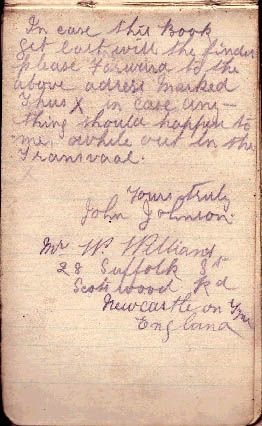
Mr W Williams
28 Suffolk Street
Scotswood Road
Newcastle on Tyne
England
Mrs H Trigg
58 Victoria
Barford
Stoke on Trent
Staff
Mr Wm Mitler
83 Brinkburn Street
South Byker
Newcastle on Tyne
Mr John Smith
5 Suffolk Street
Scotswood Road
Newcastle on Tyne
England
Mr James Ridhead
7 St Annes Row
City Road
Newcastle on Tyne
England
Mr M Rickleton
27 Pine Street
Scotswood Road
Newcastle on Tyne
Mrs N Johnson
11 Stanton Avenue
Kidsbury
Manchester
Lieutenant J Leslie Stewart
Late 7th Hussars now in the JMR South Africa
Miss A Johnson
Chatterley House
Hanley
Staffordshire
England
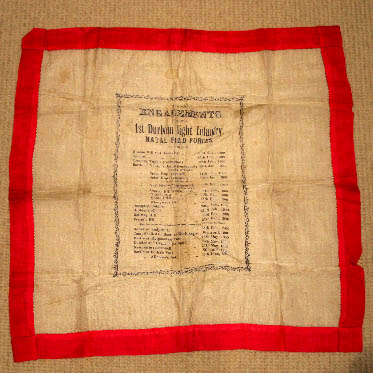
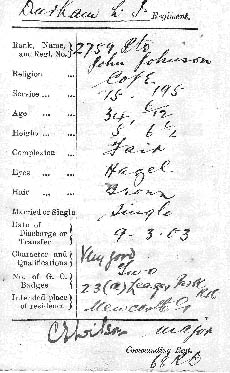
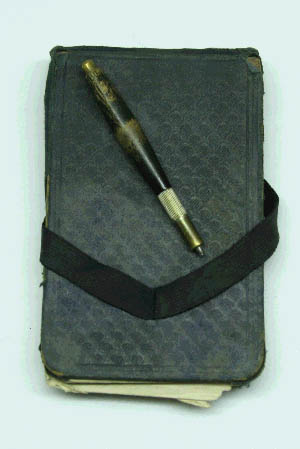
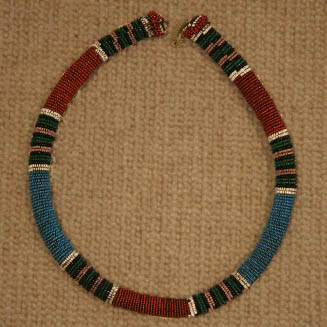
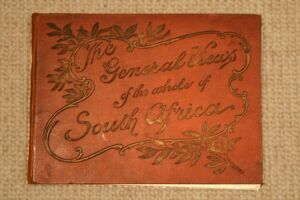
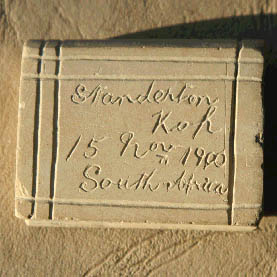
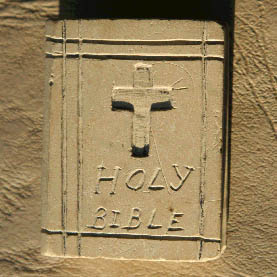
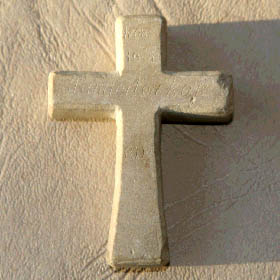
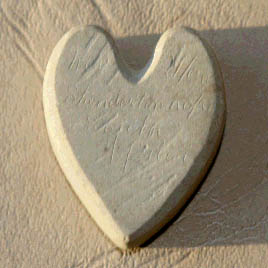
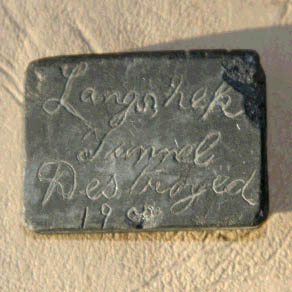
South African Military History Society / scribe@samilitaryhistory.org